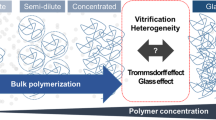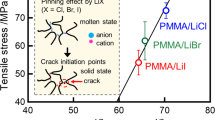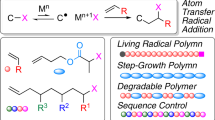Abstract
IT is well known that the reactivity of the propagating species in ionic polymerization is greatly influenced by the proximity and character of the gegenions and by complex formation. As a rule, free radical reactions are comparatively insensitive to the nature of their environment, although there are references in the literature to changes in the rate of free-radical polymerizations, and the nature of the polymers formed, which have been attributed to the participation of radicals in complexed forms. The investigation of the structure and reactivity of radical complexes in polymerization is a field which has not been surveyed systematically, but which, nevertheless, may contain interesting features. We have embarked on an investigation of the absolute rate coefficients in the free-radical polymerization of vinyl monomers in the presence of possible complexing agents and report here some results for the methyl methacrylate–zinc chloride system. The only measurements of a similar type recorded in the literature appear to be those of Bamford, Jenkins and Johnston1, on acrylonitrile in NN-dimethylformamide solution in the presence of lithium salts. Kargin, Kabanov and Zubov2 considered that the presence of zinc chloride during the polymerization of methyl methacrylate affects the microstructure of the polymer, but this finding was not confirmed by Bovey3. More recently, Imoto, Otsu and Harada4 have investigated the steady-state polymerization of methyl methacrylate in the presence of zinc chloride and have shown that at 60° C the rate of the reaction initiated by azo-bis-isobutyronitrile is increased by addition of zinc chloride, the ratio kp/√(kt) also being increased (kp, kt are the velocity coefficients for propagation and total bimolecular termination, respectively).
This is a preview of subscription content, access via your institution
Access options
Subscribe to this journal
Receive 51 print issues and online access
$199.00 per year
only $3.90 per issue
Buy this article
- Purchase on Springer Link
- Instant access to full article PDF
Prices may be subject to local taxes which are calculated during checkout
Similar content being viewed by others
References
Bamford, C. H., Jenkins, A. D., and Johnston, R., Proc. Roy. Soc., A, 241, 364 (1957).
Kargin, V. A., Kabanov, V. A., and Zubov, V. P., Vysokomol. Soedin, 2, 765 (1960).
Bovey, F. A., J. Polym. Sci., 47, 480 (1960).
Imoto, M., Otsu, T., and Harada, Y., Makromol. Chem., 65, 180 (1963).
Matheson, M. S., Auer, E. E., Bevilacqua, E. B., and Hart, E. J., J. Amer. Chem. Soc., 71, 497 (1949).
Fox, T. G., Kinsinger, J. B., Mason, H. F., and Schuele, E. M., Polymer, 3, 71 (1962).
Bevington, J. C., Melville, H. W., and Taylor, R. P., J. Polym. Sci., 12, 449 (1954); 14, 463 (1954).
Author information
Authors and Affiliations
Rights and permissions
About this article
Cite this article
BAMFORD, C., BRUMBY, S. & WAYNE, R. Effect of Zinc Chloride on the Velocity Coefficients in the Polymerization of Methyl Methacrylate. Nature 209, 292–294 (1966). https://doi.org/10.1038/209292b0
Issue Date:
DOI: https://doi.org/10.1038/209292b0
Comments
By submitting a comment you agree to abide by our Terms and Community Guidelines. If you find something abusive or that does not comply with our terms or guidelines please flag it as inappropriate.



